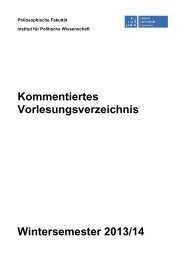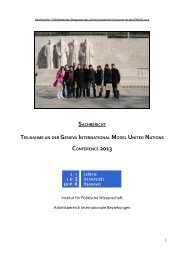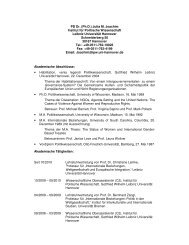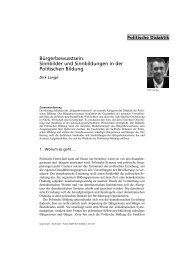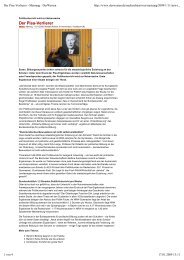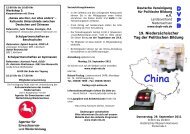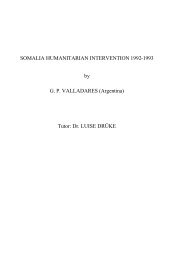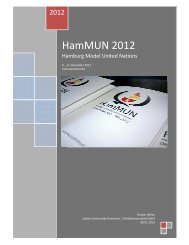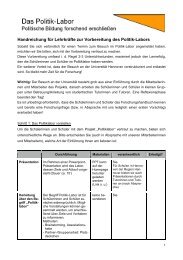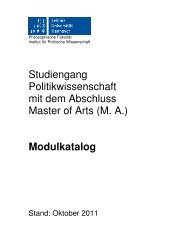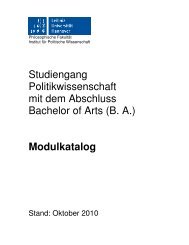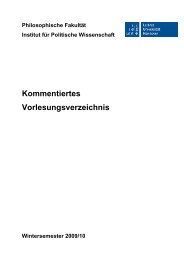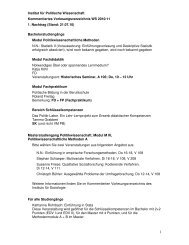Preventive Action for Refugee Producing Situations
Preventive Action for Refugee Producing Situations
Preventive Action for Refugee Producing Situations
Create successful ePaper yourself
Turn your PDF publications into a flip-book with our unique Google optimized e-Paper software.
14<br />
origin in<strong>for</strong>mation work, with a new service now responsible <strong>for</strong> this<br />
function, it has created rudimentary elements <strong>for</strong> early warning work<br />
within the organization and is cooperating in a UN interagency<br />
mechanism <strong>for</strong> this purpose. In addition, the High Commissioner is<br />
receiving increased support from member states to focus on preventive<br />
protection, with which is meant prevention of circumstances which <strong>for</strong>ce<br />
people to leave, as another aspect of solutions.<br />
Chapter 5 explores the anticipated objection to international<br />
preventive actions. The objections are rebutted on the grounds that the<br />
policy proposals do not <strong>for</strong>esee <strong>for</strong>cible intervention but are meant to help<br />
persecuted people in distress be<strong>for</strong>e they are <strong>for</strong>ced to become refugees.<br />
The following three elements are invoked as a legal/political basis <strong>for</strong><br />
supporting the new approaches and policies: (1) the consensus of states on<br />
the primacy of international obligations over national interests with<br />
respect to policies and circumstances that create refugees; (2) the<br />
development that massive violations of human rights are becoming<br />
increasingly a matter of international concern; and (3) the recognition that<br />
massive refugee flows can threaten international peace and security.<br />
The study concludes that the international community should move<br />
<strong>for</strong>cefully now, while almost global cooperation is possible, and the Cold<br />
War over, to further strengthen the institutionalizing of new preventive<br />
and interventionist approaches and policies to save lives, prevent future<br />
abuses and <strong>for</strong>ced population displacement.<br />
Acknowledgments<br />
I would like here to thank those without whose encouragement and support<br />
this dissertation would not have been completed.<br />
First of all, my thanks goes to my "Doktorvater" Jürgen Seifert, whose<br />
support and judicious criticism have been a source of inspiration<br />
throughout. He has shared his theoretical knowledge of and practical<br />
commitment to the quest <strong>for</strong> change in the name of justice. I am grateful to<br />
my other dissertation readers: David Kennedy, <strong>for</strong> his constant encouragement<br />
that enabled me to persevere and Christian Riechers, <strong>for</strong> his<br />
valuable suggestions. I am indebted to Rosemarie Rogers, <strong>for</strong> her<br />
thoughtful comments. My appreciation <strong>for</strong> stimulation <strong>for</strong> the dissertation<br />
goes to my professors be<strong>for</strong>e and during my five semesters at Harvard that<br />
ultimately led to this dissertation.<br />
Since a doctorate is the culmination of a long educational process -not<br />
merely the end of graduate work but <strong>for</strong> me also a mid-career reflection -I<br />
would like to thank all those, who, though they may not be aware of the<br />
research I have been doing over the years, have nonetheless stimulated my<br />
interest at critical junctures of my life long learning experience. So many<br />
have inspired me in exchanges of ideas and discussions over the past years<br />
of my academic and professional endeavors. I am indebted to many persons<br />
who encouraged and helped me throughout this project and my career,<br />
particularly those who generously granted me their time and their thoughts<br />
in personal interviews. I gratefully acknowledge here the valuable<br />
contributions of the interviewees, whose names are listed individually in the<br />
Appendix. I would like especially to mention Theo van Boven, Lance<br />
Clark, Guy Goodwin-Gill, Michel Moussalli, Berti Ramcharan, Zia Rizvi,<br />
and Brian Urquhart. They have been most influential in the evolution of my<br />
understanding and thinking about individual chapters of the dissertation.<br />
My special thanks goes to Henry Steiner, Director of the Harvard Law<br />
School Human Right Program (HLS/HRP), and Jack Tobin, its<br />
Administrative Director <strong>for</strong> their encouragement to focus on the link of<br />
human rights and refugee law during my time as Visiting Researcher at the<br />
HLS/HRP; to Samuel Huntington, Director of the Center <strong>for</strong> International<br />
Affairs, and Les Brown, Director of the CFIA Fellows Program and their<br />
colleagues <strong>for</strong> their support, which allowed me to carry out my



